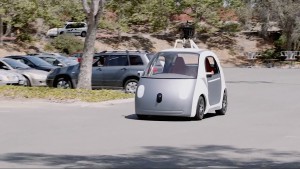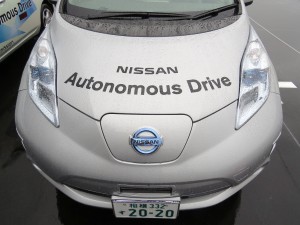Nissan is on track to put its first fully autonomous vehicle into production in 2020, CEO Carlos Ghosn is confirming. But whether they actually can be driven on public roads will depend on government regulators.
Two years ago, the Japanese maker became the first car company to commit to putting self-driving technology into production. Since then, a number of manufacturers have announced similar plans. Several states, including Nevada, Michigan and California, have enacted laws allowing prototype testing, but experts say the lack of national rules could prevent the sale and use of the technology once production begins.
“Our cars will be ready,” Nissan CEO Ghosn told reporters during a meeting at the company’s headquarters in Yokohama today.
The second-largest of the Japanese automakers actually plans a phased rollout of self-driving technology, starting with a semi-autonomous vehicle set to debut in 2016 and a more advanced model to come two years later.
But Nissan expects to go all-in by 2020 with production of a vehicle that would be able to navigate all sorts of roads, from freeways to local two-lanes, on its own. A human driver would still be needed, but only to stand by in case of an emergency.
Several automakers have laid out similar timetables. General Motors, for example, will first come to market with its SuperDrive technology – capable of autonomously handling driving on a freeway only – in 2016. Tesla also expects to phase in autonomous functionality starting next year.
The emerging field also is attracting new participants. Google is considered a leader in the field and is just rolling out a fleet of autonomous vehicles near its headquarters in Silicon Valley. But that project underscores the legal limbo manufacturers face. While the first of those “Google cars” will be equipped with a steering wheel and pedals, the tech giant plans to also test prototypes with no controls for a passenger to take control of in the case of trouble.
But, at least for now, such a system would not be permitted on the road under California’s evolving autonomous vehicle regulations – or in any other states, including pioneering Nevada, the first state to enact self-driving regulations.

Google will begin testing of its autonomous vehicle in real-world city traffic in California this summer.
Earlier this month, Nevada officials approved a pilot license for Freightliner, the nation’s largest heavy truck manufacturer, to begin on-the-road testing of its big Inspiration model, a pilot self-driving 18-wheeler. But the head of the state’s Department of Motor Vehicles emphasized the need for federal rules that would override a patchwork of potentially conflicting state regulations.
That was echoed by U.S. Transportation Secretary Anthony Foxx during a visit to Silicon Valley last week. He said he is pressing to streamline the rule-making process that will “lead to cars that can drive themselves better than a human can.”
Foxx also called for speeding up rules that likely will require future vehicles be able to “talk” to one another, as well as the roadway infrastructure.
(Google autonomous car begins testing in urban areas. For more, Click Here.)
“Connected, automated vehicles that can sense the environment around them and communicate with other vehicles and with infrastructure have the potential to revolutionize road safety and save thousands of lives,” said Foxx.
Industry experts still question whether autonomous technology will be ready by the 2020 target – even if regulators do make the right moves. But few doubt self-driving cars will be on the road within the next decade. The next question is how the technology will continue to evolve. The CEO of Uber recently suggested he’d like to see the development of completely driverless cars, something that would slash operating costs for the ride-sharing company.
(Click Here for details about the reported number of autonomous vehicle crashes.)
While that is clearly possible, and a goal for many companies, Ghosn sounded a cautious note during his Monday news conference in Japan.
“That is the car of the future,” he said. “But the consumer is more conservative. That makes us cautious.”
(To see more about the first autonomous 18-wheeler being tested in the U.S., Click Here.)
The general consensus is that it could be yet another decade before the technology is ready – and accepted by both consumers and regulators for public use.



I’d like to see extensive independent testing of all AVs prior to being licensed to operate on public roadways. We’re talking some very critical safety aspects on these vehicles that absolutely must be 100% properly functioning 100% of the time when the vehicle is in use. This means redundant mission critical system designs, crash-proof computers, unhackable electronics, mandatory emergency vehicle recognition with proper response programming and a lot more.
I’d like to see human drivers that are 100% functioning properly. Sober, paying attention, knowing the rules, etc….